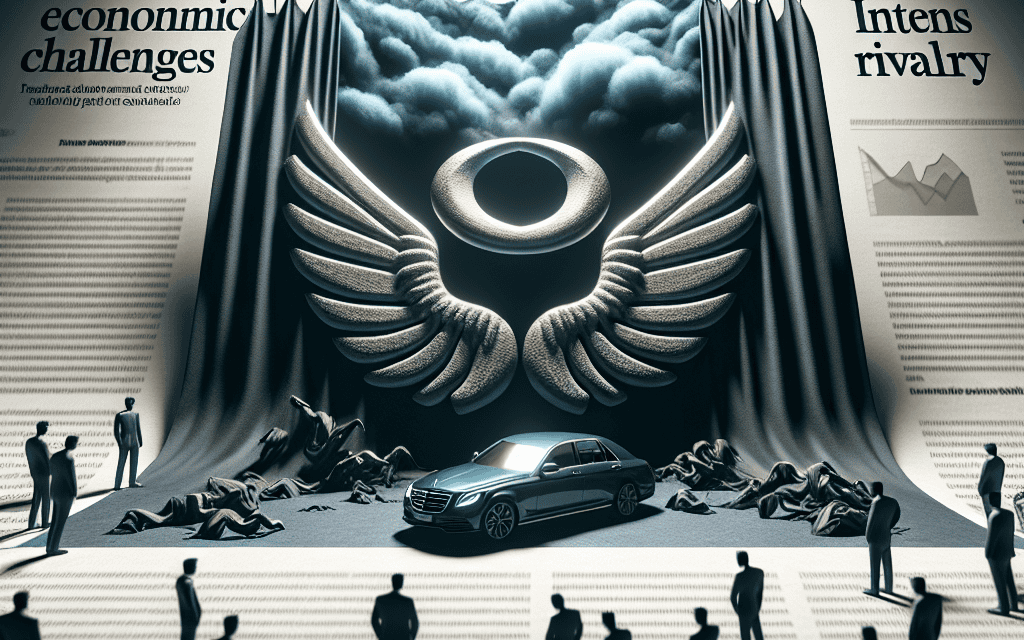“Mercedes-Benz Faces Profit Squeeze: Navigating Economic Hurdles and Fierce Competition”
Introduction
Mercedes-Benz, a leading name in the luxury automotive industry, has recently reported a decline in profits, reflecting the broader economic challenges and heightened competition within the sector. The iconic German automaker, renowned for its engineering excellence and premium vehicles, is navigating a complex landscape marked by global economic uncertainties, supply chain disruptions, and shifting consumer preferences. Additionally, the intensifying rivalry from both traditional competitors and emerging electric vehicle manufacturers is exerting pressure on Mercedes-Benz to innovate and adapt. This confluence of factors is reshaping the company’s financial performance and strategic direction, prompting a reevaluation of its market approach to sustain its legacy of luxury and performance in an evolving automotive world.
Impact Of Global Economic Challenges On Mercedes-Benz Profits
Mercedes-Benz, a stalwart in the luxury automotive industry, has recently reported a decline in profits, a development that underscores the multifaceted challenges currently facing the global economy. This downturn is not an isolated incident but rather a reflection of broader economic pressures and intensifying competition within the automotive sector. As the world grapples with economic uncertainties, including fluctuating currency values, rising inflation, and supply chain disruptions, companies like Mercedes-Benz are finding it increasingly difficult to maintain their profit margins.
One of the primary factors contributing to the decline in Mercedes-Benz’s profits is the ongoing volatility in global markets. Currency fluctuations, particularly the weakening of the euro against other major currencies, have adversely affected the company’s earnings. As a global player, Mercedes-Benz conducts a significant portion of its business in international markets, making it vulnerable to exchange rate variations. This financial strain is compounded by rising inflation rates, which have led to increased costs for raw materials and components essential for vehicle production. Consequently, the company faces the challenge of balancing these rising costs with the need to remain competitive in pricing.
Moreover, the automotive industry is currently experiencing a paradigm shift, driven by technological advancements and changing consumer preferences. The transition towards electric vehicles (EVs) is reshaping the competitive landscape, with traditional automakers like Mercedes-Benz facing stiff competition from both established rivals and new entrants. Companies such as Tesla have set new benchmarks in the EV market, compelling traditional manufacturers to accelerate their own electric vehicle development. This shift requires substantial investment in research and development, further straining financial resources and impacting profitability.
In addition to these economic and industry-specific challenges, Mercedes-Benz is also navigating the complexities of regulatory changes. Governments worldwide are implementing stricter emissions standards and incentivizing the adoption of cleaner technologies. While these regulations are crucial for environmental sustainability, they necessitate significant adjustments in manufacturing processes and product offerings. Compliance with these standards often involves costly modifications and innovations, which can erode profit margins if not managed effectively.
Furthermore, the global supply chain disruptions, exacerbated by the COVID-19 pandemic, continue to pose significant hurdles for Mercedes-Benz. The shortage of semiconductor chips, a critical component in modern vehicles, has led to production delays and reduced output. This bottleneck not only affects the company’s ability to meet consumer demand but also results in increased operational costs. As the industry struggles to stabilize supply chains, Mercedes-Benz must navigate these challenges to ensure a steady flow of products to the market.
Despite these adversities, Mercedes-Benz remains committed to its long-term strategic goals. The company is investing heavily in innovation, particularly in the realm of electric and autonomous vehicles, to secure its position in the evolving automotive landscape. By focusing on sustainability and cutting-edge technology, Mercedes-Benz aims to differentiate itself from competitors and capture a larger share of the growing EV market. Additionally, the company is exploring new business models and partnerships to enhance its resilience against economic fluctuations.
In conclusion, the decline in Mercedes-Benz’s profits is a reflection of the complex interplay between global economic challenges and industry-specific dynamics. While the company faces significant hurdles, its proactive approach to innovation and adaptation positions it well for future growth. As the automotive industry continues to evolve, Mercedes-Benz’s ability to navigate these challenges will be crucial in maintaining its status as a leader in the luxury automotive market.
Strategies Mercedes-Benz Is Implementing To Combat Profit Decline
Mercedes-Benz, a stalwart in the luxury automotive industry, is currently navigating a challenging economic landscape marked by declining profits. This downturn is attributed to a confluence of economic challenges and fierce competition from both traditional rivals and emerging players in the electric vehicle (EV) market. In response, Mercedes-Benz is implementing a series of strategic initiatives aimed at reversing this trend and securing its position as a leader in the automotive sector.
To begin with, Mercedes-Benz is intensifying its focus on innovation, particularly in the realm of electric vehicles. Recognizing the global shift towards sustainable transportation, the company is investing heavily in research and development to enhance its EV offerings. By accelerating the rollout of new electric models, Mercedes-Benz aims to capture a larger share of the growing EV market. This strategy not only aligns with global environmental goals but also positions the company to compete more effectively with rivals who have already established a strong foothold in this segment.
In addition to expanding its electric vehicle lineup, Mercedes-Benz is also prioritizing the enhancement of its digital capabilities. The automotive industry is increasingly driven by technology, and consumers are demanding more sophisticated in-car experiences. To meet these expectations, Mercedes-Benz is integrating advanced digital features into its vehicles, such as state-of-the-art infotainment systems and autonomous driving technologies. By doing so, the company seeks to differentiate its products and offer a unique value proposition that appeals to tech-savvy consumers.
Moreover, Mercedes-Benz is undertaking a comprehensive cost optimization program to improve its financial performance. This initiative involves streamlining operations, reducing production costs, and optimizing supply chain efficiencies. By adopting lean manufacturing principles and leveraging economies of scale, the company aims to enhance its profitability without compromising on quality. This approach is particularly crucial in an environment where cost pressures are mounting due to fluctuating raw material prices and global supply chain disruptions.
Furthermore, Mercedes-Benz is strengthening its global presence by expanding into emerging markets. These regions present significant growth opportunities due to rising disposable incomes and increasing demand for luxury vehicles. By tailoring its product offerings to meet the specific needs and preferences of consumers in these markets, Mercedes-Benz is positioning itself to capture new customer segments and drive revenue growth. This geographic diversification strategy not only mitigates risks associated with economic downturns in established markets but also ensures a more balanced and resilient business model.
In parallel, Mercedes-Benz is enhancing its brand image through strategic marketing initiatives. The company is leveraging digital platforms and social media to engage with a broader audience and build stronger connections with its customers. By emphasizing its commitment to sustainability, innovation, and luxury, Mercedes-Benz aims to reinforce its brand identity and maintain its status as a premium automotive manufacturer.
In conclusion, Mercedes-Benz is implementing a multifaceted strategy to combat the decline in profits amid economic challenges and intense rivalry. By focusing on innovation, digitalization, cost optimization, market expansion, and brand enhancement, the company is taking proactive steps to navigate the current landscape and secure its future success. As these initiatives unfold, Mercedes-Benz remains committed to delivering exceptional value to its customers while adapting to the evolving demands of the automotive industry.
How Intense Rivalry In The Automotive Industry Affects Mercedes-Benz
In recent years, the automotive industry has been characterized by rapid technological advancements, shifting consumer preferences, and an increasingly competitive landscape. Mercedes-Benz, a stalwart in the luxury vehicle segment, has not been immune to these pressures. The company’s recent decline in profits can be attributed to a confluence of economic challenges and intense rivalry within the industry. Understanding how these factors interplay is crucial to comprehending the current state of Mercedes-Benz and its strategic responses.
To begin with, the global economic environment has posed significant challenges for automakers, including Mercedes-Benz. Economic slowdowns in key markets, such as Europe and China, have led to reduced consumer spending power, directly impacting vehicle sales. Additionally, inflationary pressures have increased production costs, squeezing profit margins. These economic headwinds have forced Mercedes-Benz to reassess its pricing strategies and cost structures to maintain competitiveness.
Simultaneously, the automotive industry is undergoing a transformative shift towards electric vehicles (EVs) and sustainable mobility solutions. This transition has intensified competition as both traditional automakers and new entrants vie for market share in the burgeoning EV segment. Mercedes-Benz, with its legacy in internal combustion engines, faces the dual challenge of innovating in the EV space while managing the decline of its traditional vehicle sales. The company’s substantial investments in electric mobility, while necessary for long-term viability, have exerted short-term financial pressure, contributing to the decline in profits.
Moreover, the competitive landscape has been reshaped by the emergence of new players, particularly those specializing in electric vehicles. Companies like Tesla have set new benchmarks for innovation and consumer expectations, compelling established brands like Mercedes-Benz to accelerate their EV development timelines. This has led to increased research and development expenditures, further impacting profitability. Additionally, the rapid pace of technological change necessitates continuous investment in advanced features such as autonomous driving and connectivity, areas where competition is fierce.
Furthermore, consumer preferences are evolving, with a growing emphasis on sustainability and digital experiences. Mercedes-Benz must navigate these changing expectations while preserving its brand identity as a symbol of luxury and performance. This balancing act is complex, as it requires the integration of cutting-edge technology with the traditional hallmarks of the brand. The pressure to innovate while maintaining brand integrity adds another layer of complexity to the competitive dynamics faced by Mercedes-Benz.
In response to these challenges, Mercedes-Benz has embarked on a strategic transformation aimed at securing its position in the future automotive landscape. The company is accelerating its electrification plans, with a commitment to offering a fully electric lineup by the end of the decade. Additionally, Mercedes-Benz is investing in digitalization and connectivity to enhance the customer experience and streamline operations. These initiatives are designed to position the company as a leader in sustainable luxury mobility.
In conclusion, the decline in Mercedes-Benz’s profits is a reflection of the broader economic challenges and intense rivalry within the automotive industry. The company’s ability to navigate these pressures will be critical to its future success. By embracing innovation and adapting to changing consumer preferences, Mercedes-Benz aims to maintain its status as a leader in the luxury automotive segment. However, the path forward is fraught with challenges, requiring strategic agility and a steadfast commitment to excellence.
Analyzing The Financial Performance Of Mercedes-Benz In A Competitive Market

In recent years, Mercedes-Benz, a stalwart in the luxury automotive industry, has faced a confluence of economic challenges and heightened competition, leading to a notable decline in its profits. This downturn can be attributed to several interrelated factors that have collectively impacted the company’s financial performance. As the global economy grapples with uncertainties, Mercedes-Benz finds itself navigating a complex landscape that demands strategic agility and innovation.
To begin with, the global economic environment has been fraught with volatility, affecting consumer purchasing power and, consequently, the demand for luxury vehicles. Economic slowdowns in key markets, such as Europe and China, have led to a cautious approach among consumers, who are increasingly prioritizing essential expenditures over luxury purchases. This shift in consumer behavior has directly impacted Mercedes-Benz’s sales figures, as potential buyers defer or reconsider their decisions to invest in high-end automobiles. Furthermore, fluctuating exchange rates and trade tensions have added layers of complexity to the company’s international operations, affecting profitability margins.
In addition to economic challenges, Mercedes-Benz is contending with intensified competition from both traditional rivals and emerging players in the automotive sector. Established competitors like BMW and Audi continue to vie for market share, each offering innovative features and competitive pricing strategies that appeal to a broad spectrum of consumers. Meanwhile, the rise of electric vehicle manufacturers, such as Tesla, has introduced a new dimension of rivalry. These companies are not only capturing the attention of environmentally conscious consumers but are also setting new benchmarks for technological advancement and sustainability in the automotive industry.
Moreover, the shift towards electric and hybrid vehicles has necessitated significant investments in research and development for Mercedes-Benz. While the company has made strides in this area, the transition from traditional internal combustion engines to electric powertrains involves substantial financial outlays. These investments, although crucial for long-term competitiveness, have exerted pressure on short-term profitability. The need to balance innovation with financial prudence is a delicate task that Mercedes-Benz must navigate to maintain its position as a leader in the luxury automotive market.
In response to these challenges, Mercedes-Benz has embarked on a series of strategic initiatives aimed at revitalizing its financial performance. The company is focusing on streamlining its operations to enhance efficiency and reduce costs. This includes optimizing its supply chain, leveraging digital technologies, and exploring new business models that align with evolving consumer preferences. Additionally, Mercedes-Benz is intensifying its efforts to expand its presence in emerging markets, where there is potential for growth despite current economic headwinds.
Furthermore, the brand is committed to strengthening its portfolio of electric and hybrid vehicles, recognizing the growing demand for sustainable mobility solutions. By investing in cutting-edge technologies and forging strategic partnerships, Mercedes-Benz aims to position itself at the forefront of the electric vehicle revolution. These efforts are complemented by a renewed emphasis on customer experience, with the company seeking to differentiate itself through superior service and personalized offerings.
In conclusion, Mercedes-Benz’s recent decline in profits underscores the multifaceted challenges it faces in a competitive and economically uncertain environment. However, through strategic adaptation and a focus on innovation, the company is poised to navigate these challenges and emerge stronger. As the automotive landscape continues to evolve, Mercedes-Benz’s ability to balance tradition with transformation will be pivotal in securing its future success.
The Role Of Innovation In Reviving Mercedes-Benz’s Profit Margins
In the face of declining profits, Mercedes-Benz finds itself at a critical juncture where innovation must play a pivotal role in reviving its financial performance. The automotive industry is undergoing a transformative phase, driven by rapid technological advancements, shifting consumer preferences, and heightened competition. As economic challenges persist, Mercedes-Benz must leverage innovation to not only navigate these turbulent times but also to regain its competitive edge.
To begin with, the economic landscape has been fraught with challenges that have impacted the profitability of many automakers, including Mercedes-Benz. Global supply chain disruptions, fluctuating raw material costs, and geopolitical tensions have all contributed to a complex environment that demands strategic agility. In this context, innovation emerges as a crucial tool for Mercedes-Benz to differentiate itself and enhance its value proposition. By investing in cutting-edge technologies and sustainable practices, the company can address both immediate financial pressures and long-term strategic goals.
Moreover, the automotive industry is witnessing an unprecedented shift towards electric vehicles (EVs), driven by increasing environmental awareness and regulatory pressures. Mercedes-Benz has recognized the importance of this transition and has committed to expanding its electric vehicle lineup. By accelerating the development and production of EVs, the company can tap into a growing market segment and align itself with global sustainability trends. This strategic pivot not only positions Mercedes-Benz as a forward-thinking brand but also opens up new revenue streams that can bolster its profit margins.
In addition to electrification, the integration of advanced digital technologies presents another avenue for innovation. The rise of connected and autonomous vehicles is reshaping consumer expectations, with an increasing demand for seamless digital experiences. Mercedes-Benz can capitalize on this trend by enhancing its in-car technology offerings, such as advanced driver-assistance systems and intuitive infotainment platforms. By prioritizing user-centric design and connectivity, the company can create a differentiated product portfolio that appeals to tech-savvy consumers, thereby driving sales and improving profitability.
Furthermore, innovation in manufacturing processes can lead to significant cost efficiencies, which are essential for improving profit margins. Mercedes-Benz can adopt smart manufacturing techniques, such as automation and data analytics, to optimize production lines and reduce operational costs. By streamlining its supply chain and embracing lean manufacturing principles, the company can enhance its operational resilience and mitigate the impact of external economic pressures.
While innovation is undoubtedly a key driver of growth, it is equally important for Mercedes-Benz to foster a culture of innovation within the organization. Encouraging cross-functional collaboration and investing in research and development can spur creativity and lead to breakthrough solutions. By nurturing a workforce that is agile and adaptable, Mercedes-Benz can ensure that it remains at the forefront of industry trends and is well-equipped to tackle future challenges.
In conclusion, as Mercedes-Benz grapples with declining profits amid economic challenges and intense rivalry, innovation stands out as a vital strategy for revitalizing its financial performance. By embracing electrification, digitalization, and advanced manufacturing techniques, the company can not only navigate the current economic landscape but also position itself for long-term success. Through a commitment to innovation, Mercedes-Benz can enhance its competitive advantage, meet evolving consumer demands, and ultimately, restore its profit margins to a healthier state.
Mercedes-Benz’s Response To Economic Pressures And Market Competition
Mercedes-Benz, a stalwart in the luxury automotive industry, is currently navigating a challenging economic landscape marked by declining profits. This downturn is largely attributed to a confluence of economic pressures and heightened competition within the market. As the global economy grapples with inflationary pressures, supply chain disruptions, and fluctuating consumer demand, Mercedes-Benz finds itself at a critical juncture. The company must adapt to these challenges while maintaining its reputation for quality and innovation.
In recent years, the automotive industry has faced significant disruptions, with the COVID-19 pandemic exacerbating existing supply chain issues. Semiconductor shortages have particularly impacted production schedules, leading to delays and increased costs. For Mercedes-Benz, these challenges have necessitated a reevaluation of their production strategies to ensure that they can meet consumer demand without compromising on quality. Moreover, the rising costs of raw materials have further strained profit margins, compelling the company to explore cost-effective solutions without sacrificing the luxury experience that their brand promises.
Simultaneously, Mercedes-Benz is contending with intensified competition from both traditional automotive manufacturers and new entrants in the electric vehicle (EV) market. Companies like Tesla have set new benchmarks for innovation and sustainability, prompting established brands to accelerate their own EV initiatives. In response, Mercedes-Benz has committed to a robust electrification strategy, aiming to have a fully electric lineup by the end of the decade. This strategic pivot is not only a response to competitive pressures but also aligns with global regulatory trends pushing for reduced carbon emissions.
To address these multifaceted challenges, Mercedes-Benz is leveraging its legacy of engineering excellence while embracing digital transformation. The company is investing heavily in research and development to enhance its EV offerings, focusing on battery technology, range efficiency, and charging infrastructure. Additionally, Mercedes-Benz is expanding its digital services, recognizing the growing consumer demand for connectivity and personalized experiences. By integrating advanced software solutions and artificial intelligence into their vehicles, the company aims to offer a seamless and intuitive driving experience that distinguishes it from competitors.
Furthermore, Mercedes-Benz is strengthening its global supply chain resilience to mitigate future disruptions. This involves diversifying suppliers and investing in local production facilities to reduce dependency on single-source suppliers. By doing so, the company seeks to enhance its operational agility and ensure a steady flow of components necessary for production. This strategic move is crucial in maintaining production continuity and meeting market demands in a timely manner.
In addition to these strategic initiatives, Mercedes-Benz is also focusing on sustainability as a core component of its long-term vision. The company is committed to reducing its carbon footprint across the entire value chain, from production to end-of-life vehicle recycling. By adopting sustainable practices, Mercedes-Benz not only addresses regulatory requirements but also meets the growing consumer preference for environmentally responsible products.
In conclusion, Mercedes-Benz is actively responding to the economic pressures and market competition that have contributed to its recent profit decline. Through strategic investments in electrification, digital transformation, supply chain resilience, and sustainability, the company is positioning itself to navigate these challenges effectively. While the road ahead is fraught with uncertainties, Mercedes-Benz’s commitment to innovation and quality remains unwavering, ensuring that it continues to be a formidable player in the luxury automotive market.
Future Outlook: Can Mercedes-Benz Overcome Current Economic And Competitive Hurdles?
Mercedes-Benz, a stalwart in the luxury automotive industry, is currently navigating a challenging landscape marked by economic uncertainties and fierce competition. The company’s recent financial reports have indicated a decline in profits, a trend that has raised concerns among investors and industry analysts alike. This downturn can be attributed to a confluence of factors, including global economic instability, fluctuating raw material costs, and the intensifying rivalry from both traditional and emerging automotive manufacturers. As the company seeks to chart a course through these turbulent waters, it is imperative to examine the strategies that Mercedes-Benz might employ to overcome these hurdles and secure its position in the market.
One of the primary economic challenges facing Mercedes-Benz is the ongoing volatility in global markets. Economic slowdowns in key regions, coupled with geopolitical tensions, have led to decreased consumer spending and a cautious approach to luxury purchases. This has inevitably impacted the sales of high-end vehicles, a segment where Mercedes-Benz has traditionally thrived. Moreover, the rising costs of raw materials, exacerbated by supply chain disruptions, have further squeezed profit margins. In response, Mercedes-Benz has been exploring ways to optimize its production processes and reduce costs without compromising on quality, a delicate balance that is crucial for maintaining its brand reputation.
In addition to economic pressures, Mercedes-Benz is contending with heightened competition from both established rivals and new entrants in the automotive sector. Traditional competitors such as BMW and Audi continue to innovate and expand their offerings, while new players, particularly in the electric vehicle (EV) market, are rapidly gaining ground. Companies like Tesla have set new benchmarks for performance and technology, compelling Mercedes-Benz to accelerate its own EV initiatives. The company has made significant investments in electric mobility, unveiling a range of electric models under its EQ brand. However, the transition to electric vehicles is fraught with challenges, including the need for substantial infrastructure development and consumer acceptance.
Despite these challenges, Mercedes-Benz remains committed to its long-term vision of sustainable mobility and technological leadership. The company has outlined an ambitious roadmap to electrify its entire portfolio by the end of the decade, a move that underscores its dedication to innovation and environmental responsibility. Furthermore, Mercedes-Benz is leveraging its expertise in advanced technologies, such as autonomous driving and connected car systems, to differentiate itself in a crowded market. By integrating cutting-edge features into its vehicles, the company aims to enhance the driving experience and appeal to tech-savvy consumers.
Looking ahead, Mercedes-Benz’s ability to navigate these economic and competitive hurdles will largely depend on its strategic agility and capacity for innovation. The company must continue to adapt to changing market dynamics and consumer preferences while maintaining its core values of luxury and quality. Strategic partnerships and collaborations could also play a pivotal role in bolstering its competitive edge, particularly in areas like battery technology and digital services. As the automotive industry undergoes a transformative shift, Mercedes-Benz’s resilience and forward-thinking approach will be critical in determining its future success.
In conclusion, while Mercedes-Benz faces significant challenges in the current economic climate and competitive landscape, its proactive strategies and commitment to innovation provide a solid foundation for overcoming these obstacles. By staying true to its brand ethos and embracing the opportunities presented by new technologies, Mercedes-Benz can not only weather the storm but also emerge stronger and more resilient in the years to come.
Q&A
1. **What are the main reasons for Mercedes-Benz’s profit decline?**
– Economic challenges such as global supply chain disruptions, rising raw material costs, and inflationary pressures have contributed to the decline in profits.
2. **How has intense rivalry affected Mercedes-Benz’s financial performance?**
– Increased competition from other luxury car manufacturers and electric vehicle startups has pressured Mercedes-Benz to invest heavily in innovation and marketing, impacting profit margins.
3. **What specific economic challenges are impacting Mercedes-Benz?**
– The company faces challenges like fluctuating currency exchange rates, geopolitical tensions affecting trade, and increased regulatory costs related to emissions standards.
4. **How is Mercedes-Benz responding to these economic challenges?**
– Mercedes-Benz is focusing on cost-cutting measures, streamlining operations, and accelerating its transition to electric vehicles to mitigate the impact of these challenges.
5. **What role does the electric vehicle market play in Mercedes-Benz’s current situation?**
– The shift towards electric vehicles requires significant investment in research and development, which has strained financial resources but is crucial for long-term competitiveness.
6. **Are there any specific regions where Mercedes-Benz is experiencing more significant challenges?**
– The company is facing particular difficulties in regions with slower economic recovery post-pandemic, such as parts of Europe and Asia, where consumer demand has been sluggish.
7. **What are the future prospects for Mercedes-Benz amid these challenges?**
– While short-term profits may be under pressure, Mercedes-Benz’s commitment to innovation and sustainability positions it well for future growth, especially as the demand for electric vehicles increases.
Conclusion
Mercedes-Benz has experienced a decline in profits due to a combination of economic challenges and intense competition within the automotive industry. The global economic slowdown, supply chain disruptions, and rising material costs have exerted pressure on the company’s financial performance. Additionally, increased competition from both traditional automakers and emerging electric vehicle manufacturers has intensified the market dynamics, forcing Mercedes-Benz to invest heavily in innovation and sustainability initiatives. Despite these challenges, the company remains committed to its strategic goals, focusing on expanding its electric vehicle lineup and enhancing operational efficiencies to navigate the evolving market landscape and restore profitability.





